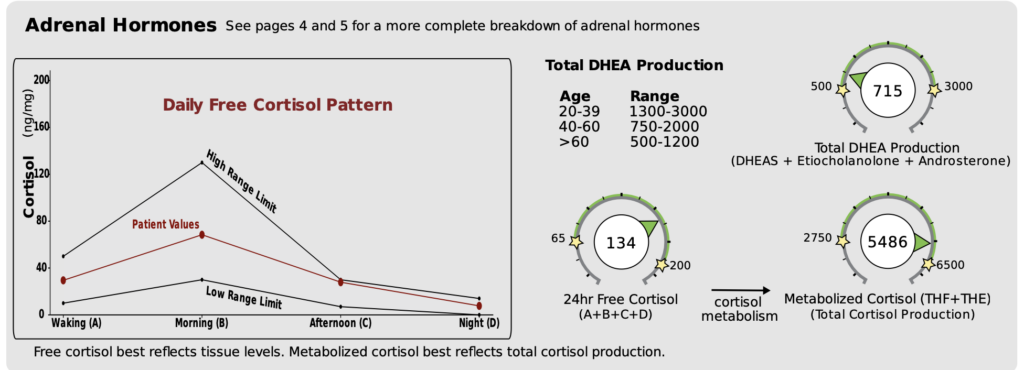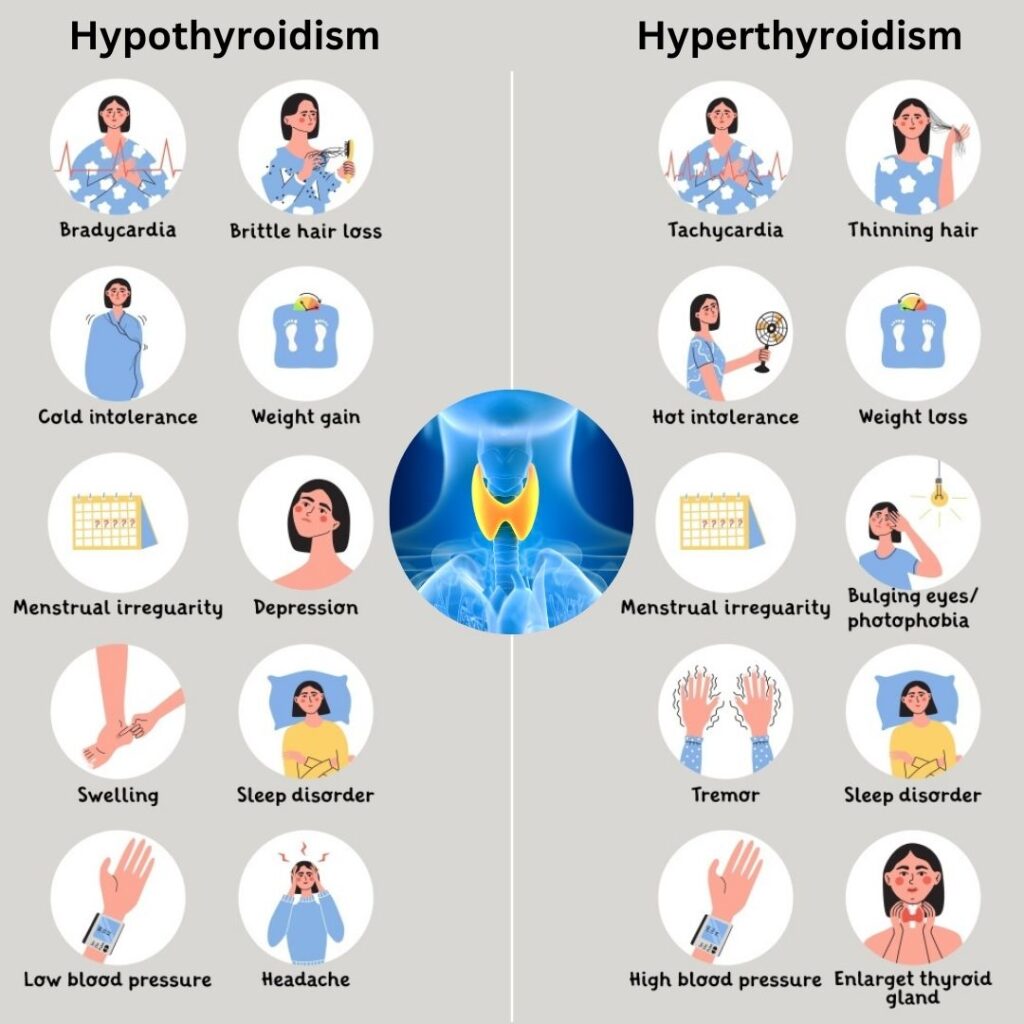What's On This Page?
ToggleMaybe it’s work, or a relationship… perhaps it is poor health for you, or a loved one. Maybe it is the neverending swirling news of politics and the microstressors of social media. There are a million reasons you could be under more stress than normal. But there’s one reason you should try to control it. Your thyroid gland!
There is a significant connection between stress hormones, particularly cortisol, and autoimmune thyroid disorders such as Graves’ disease and Hashimoto’s thyroiditis. There is a picture below with the symptoms of each so you can see if you match up. Also, keep in mind that your symptoms may alternate between both of hyper and hypothyroidism due to erratic hormone levels as destruction of the tissue progresses. This explains why people feel like they’re going crazy during the autoimmune process.
About Cortisol
Cortisol is known as your “stress hormone” and it’s secreted from your two adrenal glands which are in the back near your kidneys. Cortisol is called a “stress” hormone and named this way because it’s released in higher amounts during the body’s “fight or flight” response to stress. What if you have been to war? What if you have been raped? Or assualted?
Did you know PTSD impacts cortisol levels too? Experts believe that people with PTSD experience heightened cortisol reactions to stress, but maintain lower baseline cortisol levels during calm times to balance the heightened response. You may be interested in another article I wrote concerning PTSD – just CLICK HERE to read it.
Everyone has felt this surge of energy and power at some time in their life!
I hope you will take some time right after reading this to peek at my other article with solutions: 6 Simple Solutions to Cope with Stress that You Can Implement Today.
Cortisol is not bad, it’s actually critical to having a healthy, comfortable life. Its primary functions include regulating metabolism, controlling blood sugar levels, and reducing inflammation. However, chronic stress leading to consistently elevated or imbalanced cortisol levels can have various effects on the immune system and thyroid function.
Cortisol’s Impacts on Specific Systems
Immune System Modulation: Cortisol has immunosuppressive effects at high or prolonged levels, which can alter your immune system response in a negative way. In the context of autoimmune thyroid diseases, such as Graves’ disease (which leads to hyperthyroidism) and Hashimoto’s thyroiditis (which as you know ultimately results in hypothyroidism), the dysregulation of the immune system is a central feature.
And high cortisol worsens these diseases. Some doctors think it will trigger them! That’s a scary thought because millions of people live under chronic stress. Prolonged exposure to high levels can exacerbate any autoimmune disorder, this has a lot of documentation.
Thyroid Hormone Metabolism: Cortisol can also impact the metabolism of thyroid hormones. For example, high levels can interfere with the conversion of thyroxine (T4) to triiodothyronine (T3), the active form of thyroid hormone. This can lead to symptoms of hypothyroidism, even if the thyroid gland itself is producing hormones at normal rates.
Thyroid Receptor Sensitivity: This is a big deal. You may very well have plenty of T4 production, but if it can’t get into the cell due to poor receptor sensitivity, you’re still hypothyroid! Chronic stress and elevated cortisol levels affect the sensitivity of thyroid hormone receptors, making them less responsive. It’s what I call “thyroid sick” in my best-selling book which is available on Amazon. CLICK HERE to see it on Amazon. It’s also available at my own store, in case you shop with me already.
Even if thyroid hormone levels are within normal ranges, if your body’s cells become less sensitive to these hormones (due to high cortisol), symptoms of thyroid dysfunction can still manifest and all the symptoms that go with it!
Stress and Autoimmunity: Stress is believed to be a trigger for the development and flare-ups of autoimmune diseases. Since both Graves’ disease and Hashimoto’s thyroiditis are autoimmune in nature, stress can play a crucial role in their onset and progression. The exact mechanisms are complex and involve both the direct effects of cortisol on the immune system and the body’s overall response to stress, which can include other hormonal imbalances and inflammatory responses.
How to Test for Cortisol
To accurately gauge cortisol levels and understand the body’s response to stress, the 4-point saliva cortisol test is often considered the gold standard. This test measures the hormone at four different times throughout the day—morning, noon, evening, and night—providing a comprehensive view of the adrenal glands’ function and the body’s circadian rhythm of this hormone’s production.
Such detailed profiling is crucial because cortisol levels fluctuate throughout the day, peaking in the morning and tapering off by night. A single measurement could miss abnormalities in these patterns, which are vital for diagnosing conditions like adrenal fatigue or dysregulation.

For those looking for an even more comprehensive assessment, the DUTCH Complete Test is an excellent option. I sell it without prescription or need for appointments. You can buy it online from my STORE.
Not only does it include the 4-point cortisol testing to evaluate your stress response and adrenal health, but it also provides an extensive overview of your hormone levels, including sex hormones like metabolites of progesterone, estrogen, testosterone, DHEA and DHEA-S, and more!
This test offers deep insights into not just your adrenal health but also your overall hormonal balance, using advanced urine testing technology for accuracy and convenience. By choosing the DUTCH Complete test, you’re not only getting detailed information on your cortisol patterns but also a holistic view of your body’s hormonal health.
You may wonder if you can test cortisol in the blood, and YES you can, but I wouldn’t recommend it unless you have Cushing’s disease or Addison’s. That’s because a blood test is one snapshot of time, but it’s better to know 4 times of the 24-hour day.
This gives you a circadian rhythm. It’s important because cortisol fluctuates throughout the day, peaking in the morning and reaching their lowest point at night. Take a look at my own hormone values below, which are off my recent DUTCH test. I’m sharing it so you can see the 4 points on that graph. If you’re looking at the age and ranges section, I am 59 at the time of this writing so you can see. Look on the right side… you will see two little yellow stars indicating the low range and the high range. My ranges fall in between the two yellow stars so that’s good.
Seeing the graph is important and you don’t get that with a single blood test. A single blood test only provides a snapshot of cortisol levels at that specific moment, which may not accurately reflect your pattern in response to daily stressors.

Do I need to mention there’s a needle stick involved in blood testing? An at-home urine test is more convenient and checks all 4 times. Last thing, there is free cortisol (it’s biologically active) plus metabolites of it that are important and not measurable in the blood.
Summary
In conclusion, the relationship between stress hormones like cortisol and thyroid autoimmune diseases like Graves’ and Hashimoto’s is significant. Managing stress and maintaining balanced hormone levels through lifestyle interventions (such as regular exercise, stress-reduction techniques, and adequate sleep) and, in some cases, medical management can be important parts of managing these thyroid conditions.
Evaluating cortisol is tricky. A saliva test or a DUTCH test are better than blood tests. Managing stress is important to your overall health, not to mention thyroid hormone levels and autoimmune antibodies.

Suzy Cohen, has been a licensed pharmacist for over 30 years and believes the best approach to chronic illness is a combination of natural medicine and conventional. She founded her own dietary supplement company specializing in custom-formulas, some of which have patents. With a special focus on functional medicine, thyroid health and drug nutrient depletion, Suzy is the author of several related books including Thyroid Healthy, Drug Muggers, Diabetes Without Drugs, and a nationally syndicated column.


